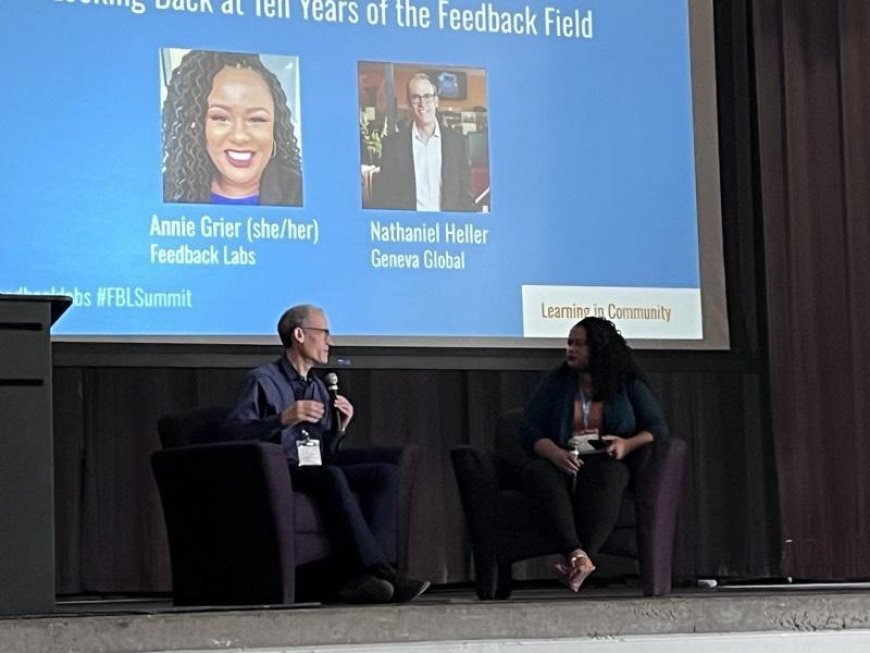Community feedback for better philanthropy: Are we there yet?
I recently had a chance to attend the Feedback Labs Summit in Denver, Colorado with 200+ practitioners who believe in the power and importance of integrating meaningful community and “beneficiary” feedback into philanthropy and international development. Marking its 10-year anniversary, Feedback Labs has been instrumental in building a global movement around the importance of centering […] The post Community feedback for better philanthropy: Are we there yet? appeared first on Geneva Global.

I recently had a chance to attend the Feedback Labs Summit in Denver, Colorado with 200+ practitioners who believe in the power and importance of integrating meaningful community and “beneficiary” feedback into philanthropy and international development. Marking its 10-year anniversary, Feedback Labs has been instrumental in building a global movement around the importance of centering the voices and perspectives of those philanthropy strives to serve at the center of decision-making.
The premise seems obvious: any high-functioning business wouldn’t ignore customer preferences and needs, right? So why would a high-functioning foundation or development organization? Unfortunately, the latter has indeed been the case for generations because of the broken feedback loops in philanthropy and international development. Implementing organizations are incentivized to care more about what their donors think rather than the communities they serve (since their funding comes from third-party donors rather than communities). Private donors, meanwhile, are (to be blunt) accountable to hardly anyone except their boards and/or living donors and lack the right incentives to place primacy on what actual community experience and needs look like. Sure, we get it right sometimes, but not nearly often enough.
What I heard in Denver was a cause for hope and a reminder that we have plenty of road left to travel on this journey. Here are my takeaways from a rich three days of discussion and debate.
- Yes, fixing the broken feedback loops in philanthropy is more the norm rather than the exception compared to a decade ago. I made this point in the opening plenary fireside chat, and it’s backed up by new research published by ORS Impact demonstrating significant gains in building a “pro-feedback” global community. There’s significant evidence that we have successfully shifted norms to be sensitive to the need to center feedback in philanthropy. We no longer need to preach the feedback gospel to as many donors and doers as we used to, and that’s a very good thing. But…
- The gains remain incomplete. I know in both Geneva Global and Global Impact’s day-to-day work that we still routinely run into tone-deafness when it comes to getting donors to pay attention to community and beneficiary feedback. This remains an especially acute challenge in “elite” donor circles and activities such as pooled funds and donor collaboratives which, for a variety of reasons I won’t fully unpack here, are prone to donor groupthink and top-down, donor-centric planning. I struggle to point to good examples where large, global philanthropic pooled funds have started their planning with genuine community needs assessments and active listening. Instead, most of that work is confined to “professional” grantmakers identifying problems and opportunities for funding, regardless of what last-mile communities might say about those priorities. We can and need to do better moving forward.
- Feedback is deeply linked to equity and inclusion. Perhaps the richest learning I took away from the summit was the link between community feedback and equity and inclusion. Soliciting meaningful feedback from communities (and acting on that feedback) is an incredibly powerful (and inexpensive!) way to bring historically underrepresented and marginalized voices into decision-making. Investing in feedback is not only instrumentally important – it leads to better program design and implementation – but it’s equally important intrinsically by leveling and expanding the proverbial playing field, bringing more diverse and representative voices into otherwise closed-door decision-making spaces.
A big thanks again to Britt Lake and the entire Feedback Labs team for an incredible week and for the opportunity to share a few thoughts in Denver!
The post Community feedback for better philanthropy: Are we there yet? appeared first on Geneva Global.
What's Your Reaction?



















